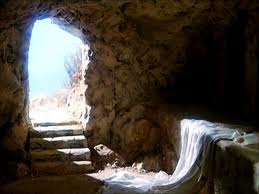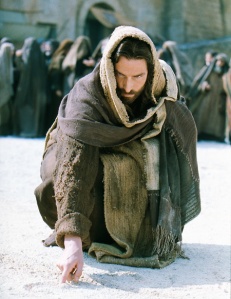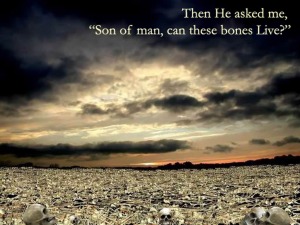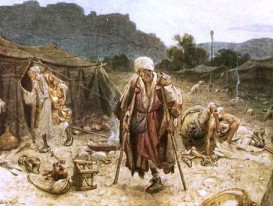
Adoption
“…like one of the king’s sons” 2 Samuel 9:11b
Read 2 Samuel 9
Adoption is something we understand in our society. A family decides to take in a child either because they have no children of their own, or because they want to add to their family. It may be an infant or an older child. The normal process is that the parent searches for the child. The child doesn’t take the initiative and demand entrance into the family.
Likewise, adoption as a theological term is focused on the personal relationships salvation brings. Grudem says, “Adoption is an act of God whereby He makes us members of His family.”
One of the most beautiful examples of adoption is found in the account of King David’s grace extended to Mephibosheth, the disabled son of Jonathan. Here we see a strong and powerful king stoop down to reach out to someone who is everything he is not. He does it because of covenant mercy.
In this account in 2 Samuel, we see King David takes the initiative to search out relatives of Jonathan. He is under no obligation. He is pondering his love for Jonathan and remembering his covenant. He seeks out a descendant of Jonathan merely because he wants to show him favour. David had promised both Saul and Jonathan that he wouldn’t destroy their descendants, as was the custom of kings to put away rivals to the throne. We find those in 1 Sam. 20:12-17, 41-42, 1 Sam. 23:16-181 Sam. 24:20-22. Read.
He wonders, “Is there anyone who is left of the house of Saul, that I may show kindness for Jonathan’s sake?” In verse 3 he calls it “the kindness of God.” This word kindness can also be translated covenant-faithfulness or grace. A covenant is a contract between two parties. Grace, according to Chuck Swindoll, “…can mean unmerited favour—extending special favour to someone who doesn’t deserve it, who hasn’t earned it, and can never repay it.”
Notice David doesn’t qualify the request, he just asks, “Is there anyone?” not, “Is there anyone worthy, or qualified?” It’s enough that he has promised, and he means to keep his promise. David finds a former servant of Saul and inquires again. Ziba knows of a son of Jonathan, but warns David about Mephibosheth’s disability. He may be trying to subtly warn David that Mephibosheth wouldn’t look good in the court of the king. David doesn’t care. He just asks, “Where is he?”
Mephibosheth was the only surviving son of Jonathan, King Saul’s son. In 2 Sam. 4:4 we read about his crippling accident when he was only five years old. (read) When news came of the death of his father and grandfather, Mephibosheth’s nurse took him and fled. He fell and became lame in his feet. He was now living with a friend, in a barren place. He had no home or property of his own, even though he was the grandson of the king. But God has no grandchildren. We must each be adopted individually into His family as sons and daughters.
Mephibosheth receives a summons. A summons is not like an invitation to a party, which can be declined. It is a request that comes with authority and if he would not come willingly, with means to bring it about. What must he have thought when he heard King David’s servants say, “The king wants to see you.”? Did he feel fear, or merely resignation, knowing this day would come?
Mephibosheth tosses aside his cane and falls at David’s feet, probably expecting a sword on his neck. Instead, what does he receive? The king calls him by name, and says,
“Do not fear.” That’s comfort
“For I will surely show you kindness…” That’s grace
“And will restore to you all the land of Saul your grandfather.” That’s inheritance
“…and you shall eat bread at my table continually.” That’s communion/fellowship
Just like that, Mephibosheth goes from a place of barrenness to a place of honour. He knows he doesn’t deserve this favour. He refers to himself as a dead dog.
David further instructs Mephibosheth’s servant Ziba and his sons and servants to farm the former property of Saul, which he has now bequeathed to Mephibosheth. This was probably extensive property. Up until now he probably has not farmed it since he has been in hiding, fearing for his life. He has reason to fear for the accepted practice of the day was that when a new king came to the throne he’d secure his kingdom by removing all threats to it from the previous king’s descendants. Mephibosheth also would have no doubt heard how his uncle Ishbosheth was murdered in his bed. He would not be sure if David was responsible for it, or the death of General Abner, whom Joab killed.
But now he has an inheritance to pass on to his own sons. David does this, and yet does not send Mephibosheth away. He could have just given him the land and been done with him. Instead, he insists on giving him a home in the palace. Mephibosheth will “eat at my table like one of the king’s sons.” This is where we see adoption, with all the privileges we mentioned.
Chuck Swindoll says, “He may be heard coming to dinner, his cane clop clopping on the floors, but once he is seated, the tablecloth of grace covers his crooked feet.”
Likewise, we were estranged from our Father because of our sin, lame in our “walk”, our lifestyle. We were in the wilderness with no home of our own, no inheritance, no comfort and no fellowship. Just as Adam and Eve hid from God, we were in hiding because of our sin. Sin causes shame.
“Pride and shame. You’d never know they were sisters. They appear so different. Pride puffs out her chest. Shame hangs her head. Pride boasts. Shame hides. Pride seeks to be seen. Shame seeks to be avoided. But don’t be fooled, the emotions have the same parentage. And the emotions have the same impact. They keep you from your Father. Pride says, ‘You’re too good for Him.’ Shame says, ‘You’re too bad for Him.’ Pride drives you away. Shame keeps you away. If pride is what goes before a fall, then shame is what keeps you from getting up after one.”
Max Lucado–He Chose the Nails
We’re afraid to look up into the face of God. We’re ashamed. What if he doesn’t accept us? But then He lifts our chin and we look into His face. What do we see there? Judgment? Censure? Disapproval? Condemnation? Oh, no. We see Love. Acceptance. Pardon.
Then we hear the summons of the King, the effectual call of the gospel. We hear it, recognize its truth, and believe it. We agree with the Word of God. We know we are deserving of judgment, not mercy.
God the Father initiated the process. He searched us out, not because we were loveable, but because of the love He has for His Son and the covenant He made with Abraham, Isaac, Jacob and David. He has promised to give His Son the nations for His inheritance. That’s us! So He decides to take us into His family. He is under no obligation to do so. He adopts us. He gives us the family name: Christian, which means, “little Christs”. There is to be a family resemblance in character to our Heavenly Father, who is holy, and to our Elder Brother, Jesus Christ. We love those who are now our brothers and sisters. We know that our conduct matters. If, in a human family the actions of one cause either shame or honour to the whole family, how can we live as if we were not bearing the family name, Christian?
We can now have comfort with no fear of condemnation. He shows us grace that we don’t deserve, haven’t earned, and can never repay. He takes care of our needs. He leads us. He disciplines us as sons and daughters. He makes us heirs with Christ. Think of that! Such an inheritance! What can the world possibly offer us? And we have communion with this One through prayer, through His word, and we will one day see Him face to face.
We also have the privilege of suffering with Him. “…and if children, then heirs—heirs of God and joint-heirs with Christ, if indeed we suffer with Him, that we may also be glorified together.” Rom. 8:17
For those of us without fathers, He is the Father of the fatherless. What a privilege to be adopted into THIS family!
“Behold what manner of love the Father has bestowed on us, that we should be called children of God!” 1 John 3:1
What about Machir?
We first hear of Machir, son of Ammiel in 2 Sam. 9:4 Here he seems to be loyal to the house of Saul, sheltering the son of Jonathan in a place called Lo Debar. Yet later on, when Absalom rebels, he becomes loyal to David, appearing with two others with provisions for David and his family when they fled from Jerusalem.
“Now it happened, when David had come to Mahanaim, that Shobi the son of Nahash from Rabbah of the people of Ammon, Machir the son of Ammiel from Lo Debar, and Barzillai the Gileadite from Rogelim, brought beds and basins, earthen vessels and wheat, barley and flour, parched grain and beans, lentils and parched seeds, honey and curds, sheep and cheese of the herd, for David and the people who were with him to eat. For they said, ‘The people are hungry and weary and thirsty in the wilderness.’” 2 Sam. 17:27-29
Did David’s care of Mephibosheth change his loyalties? Perhaps.
What happens to Mephibosheth later on?
His future continues to be linked with his servant Ziba, for good and bad. Ziba, who had fifteen sons and twenty servants, was charged with farming all the land that had formerly belonged to Saul. This provided for Mephibosheth’s family. Read 2 Sam. 9:2-4, 9-11.
But when Absalom rose up against David, causing David and his family to flee, Mephibosheth was left behind. See 2 Sam.16:1-4. What caused Ziba to turn on Mephibosheth and slander him before David? Was it greed? Was it not enough to care for the land? Did he desire to own it for himself and his many sons? It would appear to have worked, for when David first heard the accusation that Mephibosheth had designs on the throne, he seemed to believe it. He immediately handed over all of Mephibosheth’s property to Ziba without any further inquiry. Didn’t Mephibosheth deserve the benefit of the doubt? Had he ever given any indication of disloyalty to David?
At this point David was discouraged and depressed. His own son rose against him and was now seeking to kill him. Soon another would curse him and he basically said, “Bring it on. Let him curse.” He didn’t know who to trust. Perhaps this descendant of Saul was showing his true colours.
Yet, when the crisis was over and Absalom was dead, David began the trek back to Jerusalem. There to meet him at the Jordan were Shimei, the man who cursed him, and wonder of wonders, Ziba. He even brought along his fifteen sons and twenty servants for support. Read 2 Sam. 19:15-17 However, this time he said nothing, for Mephibosheth was there to speak for himself. Read 2 Sam. 19:24-30 His unkempt appearance showed his mourning the whole time the king was gone. Not the appearance of one who expected to be restored to the throne of his grandfather.
Yet David’s discernment and judgment was still lacking. He heard Mephibosheth’s story, that Ziba had deceived him and slandered him before the king, reasoned it could be true based on his disability, saw his appearance, heard no protest or denial from Ziba, and yet he was frozen with indecision.
Mephibosheth claimed no special privilege, even knowing David’s covenant with Jonathan. He left it with David to judge wisely, saying, “…but my lord the king is like the angel of God. Therefore do what is good in your eyes.” 1 Sam. 19:27b
He realized his situation had been much worse before, yet David had shown him mercy. “For all my father’s house were but dead men before my lord the king. Yet you set your servant among those who eat at your own table. Therefore what right have I still to cry out anymore to the king?” 2 Sam. 19:28
This is when you’re reading and you wish David could see what you see. Mephibosheth is telling the truth. He isn’t a deceiver, he was deceived. He isn’t lying; he was slandered. He’s not after land; his servant is.
But even the best of men are men at best, and David disappoints us with his indecision. Because he’s not sure which one has told the truth, he dismisses the case and comes up with a half-way solution, dividing the land up between Ziba and Mephibosheth.
While Ziba is probably happy with the arrangement, instead of being punished for his lies and deceit, Mephibosheth now shows his true humility. He relinquishes his rights and says Ziba can keep all the land; he’s only happy the king has returned safe and sound.
“Then Mephibosheth said to the king, ‘Rather, let him take it all, inasmuch as my lord the king has come back in peace to his own house.’” 2 Sam. 19:30
In the future, when wise King Solomon hears a similar case, he rightly judges who the true owner is because of their willingness to give up their rights for the greater good. (1 Kings 3:16-28)
Read 2 Sam. 21:7 The final time he is mentioned was when he was spared by David, even when other members of Saul’s family were put to death. The reason Scripture gives us is because of the oath between David and Jonathan. At this point, David may have renewed his confidence in Mephibosheth, or else he spared him in order to keep his oath.
Prayer: “Heavenly Father, what a privilege to be able to say that we are the children of God, adopted into the royal family, heirs of God and joint-heirs with Jesus Christ, who owns all things! That we should bear the name Christian. Lord, make us holy, so we can bear the name in a manner worthy of our calling, that we will not bring dishonour to Your name. You have given us so much in Christ. You searched us out when we were hiding in the wilderness of our sin, fearing the punishment that was sure to fall on us. You summoned us, not because we were loveable, but because of Your covenant-faithfulness. You not only showed us mercy in not giving us what we deserve, since we were Your enemies, but you showed us grace, compassion, and care. You took us into Your family, gave us provisions, fellowship and an inheritance that doesn’t fade away, reserved in Heaven for us. All because of Your Son, whom You love. Even when others may slander us before the world, or the enemy of our souls accuse us before Your throne, we know that unlike David, You will judge righteously, for You read our hearts. Thank you so much for the promise of adoption to all who believe. In Jesus’ name, Amen.”
Questions for Discussion:
Any questions or comments?
Did you ever see the gospel in this narrative before?
Have you considered the doctrine of adoption and all it entails before?
What was the most surprising aspect of this doctrine or narrative to you?
Response:
Live in the light of who we are in Christ. He is our Elder Brother. Let the world fade away.






